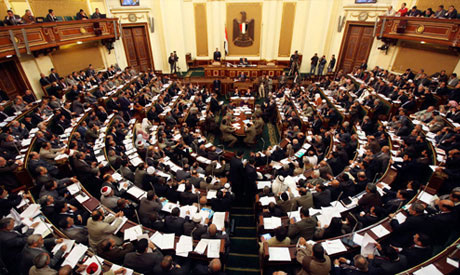
File photo: Egyptian parliament (Photo: Reuters)
Egypt's House of Representatives is scheduled to discuss a number of new laws when it convenes on Sunday, Monday and Tuesday of this week. Topping the list are three laws aimed at regulating the protection of personal data, and the performance of the Authority of the Grand Egyptian Museum and the Authority of the National Museum for Egyptian Civilisation.
According to a report prepared by parliament's Telecommunications and Information Technology Committee, the government-drafted law on the protection of personal data aims to safeguard citizens, economic institutions, and businesses against the malicious use of their own data, and helps protect the economic and investment national security of Egypt.
"This new law targets providing the legal framework necessary to regulate the protection of personal data that is electronically processed and stored," said the report, adding that "the law incriminates the collection of personal data of any citizens in an illegal way or without the prior approval of these citizens, not to mention that it also incriminates the malicious use of these data."
Besides, the report added, the law helps regulate the transmission and processing of data and statements across borders in a way that generates benefits for citizens and the national economy and contributes to protecting investments and businesses in line with international standards in this respect.
"The law seeks to safeguard the privacy of the data of citizens and the various institutions operating in and out of Egypt and guarantees a tight protection of national investments, especially those dealing with the European Union," said the report.
To meet the latter objective, the law obligates holders and processors of personal data to implement the latest international criterion in this respect, namely the General Data Protection Regulation, to block the interruption or infiltration of private data.
Parliament is also expected to discuss government-drafted laws aimed at regulating the Authority of the Grand Egyptian Museum, and the Authority of the National Museum for Egyptian Civilisation.
The House is scheduled to debate amendments to the law on the lists of terrorist entities and terrorists (Law 8/2015). The law aims to exempt prosecution authorities from publishing the lists of movements and persons designated as terrorists in national newspapers to save money and costs.
This week's schedule of debates shows parliament set to take a final vote on four laws the articles of which were approved by MPs in previous sittings. These include amendments to the Penal Code, the Documentation and Public Notary Law (70/1964), the Cases and Procedures of Appealing before the Court of Cassation Law (57/1959), and the Regulation of the Zuweil City for Science and Technology (Law 161/2012).
On Sunday MPs are expected to reach a date on when 39 interpellations would be discussed. The interpellations, submitted by a number of MPs, direct questions at cabinet ministers on critical issues such as the astronomical rise in household electricity bills, the lack of drugs and medical equipment in government hospitals, the renovation of textile factories, and the upgrading of railway services.
On Tuesday, parliament will discuss 18 information requests and three questions directed at Minister of Telecommunications and Information Technology Amr Talaat.
The majority of questions Talaat will be requested to answer have to do with his ministry's role in confronting "the electronic wars" and the social media rumours targeting Egypt. MP Said Hassasin said the social media wars which Egypt faced in the last month show that the Ministry of Telecommunications was not ready enough to contain them.
"We need to know the ministry's strategy in fighting these wars in the future in order to safeguard the country against their malicious impact on national security," said Hassasin.
Short link: